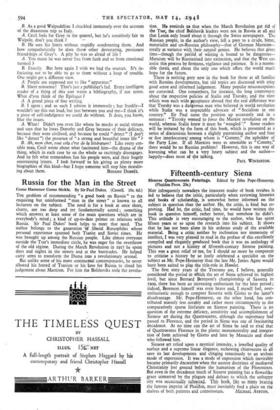Russia for the Man in the Street
Come Hammer Come Sickle. By Sir Paul Dukes. (Cassell. 10s. 6d.) THE problem of recommending " a good book on Russia " to the enquiring but uninformed " man in the street " is known to all lecturers on the subject. The need is for a book at once short, chatty, not too deep and yet fundamentally sound ; something which answers at least some of the main questions which are in everybody's mind ; a kind of up-to-date primer on relations with Russia. Sir Paul Dukes' book helps to meet that need. The author belongs to the generation '.of liberal Russophiles whose personal experience spanned both Tsarist and Soviet times. He was brought up among the Russian people. Like almost everyone outside the Tsar's immediate circle, he was eager fot the overthrow of the old regime. During the March Revolution in 1917 he spent days and nights in the streets and at the barricades. He helped carry arms to transform the Duma into a revolutionary arsenal.
But unlike some of his more sentimental contemporaries, he never allowed his hatred of Tsarism or his love for Russia to cloud his judgement about Marxism. For him the Bolsheviks stole the revolu- tion. He reminds us that when the March Revolution got rid of the Tsar, the chief Bolshevik leaders were not in Russia at all and that Lenin only heard about it through the Swiss newspapers. The Russian people, in the author's view, fell a prey to a crude, bitter, materialist and un-Russian philosophy—that of German Marxism— totally at variance with their natural genius. He believes that given time—though the period of waiting is bound to be dangerous— Marxism will be Russianised into extinction, and that the West can assist this process by firmness, vigilance and patience. It is a reason- able thesis, and about the only one which offers the world much hope for the future.
There Is nothing very new in the book for those at all familiar with Russian developments, but old topics are discussed with crisp good sense and informed judgement. Many popular misconceptions are corrected. One remembers, for instance, the long controversy about the respective policies of Stalin and Trotsky, and the view which won such wide .receptance abroad that the real difference was that Trotsky was a dangerous man who believed in world revolution while Stalin was a respectable advocate of " Socialism in one country." Sir Paul sums the position up accurately and in a sentence: "Trotsky wanted to force the Marxist revolution on the world, whereas Stalin knew it must be ' wangled '." Some readers will be irritated by the form of this book, which is presented as a series of discussions between a slightly patronising author and four or five interlocutors; among whom is "C,ommy," the upholder of the Party Line. If all Marxists were as amenable as " Commy," there would be no Russian problem! However, this is one way of leavening what can be a very heavy subject and the author- happily—does most of the talking.
PAUL WINTERTON.






























 Previous page
Previous page